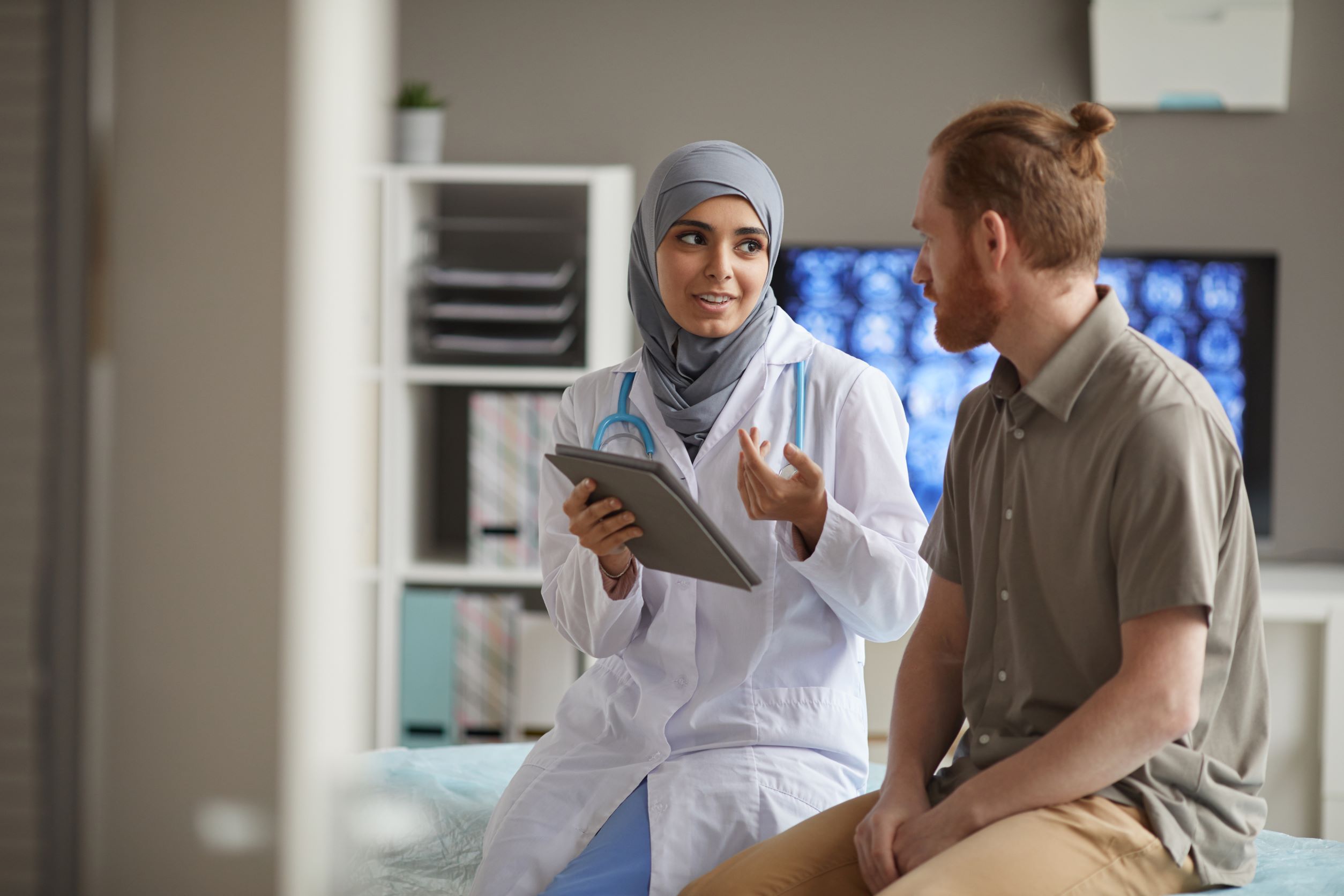Muslim Center Opens Free Health Clinic
Muslim Center Opens Free Health Clinic
Adapted from The HUDA Clinic: A Case Study of the Reimagining Muslim Spaces series developed by the Institute for Social Policy and Understanding.
For a long time, American Muslims have contributed to providing health services to low-income, underserved populations in their communities. The HUDA Clinic in Detroit, Michigan, is an example. Established in 2004, the HUDA (Health Unit on Davison Avenue) Clinic began operations on the second floor of a mosque, The Muslim Center of Detroit. The Muslim Center has a strong focus on community service, with a vision of creating a distinct Islamic footprint. According to the center’s website, they wish “to work with Christians, Jews and other religions, as well as people of goodwill, putting our common God first.” Other services at the Muslim Center include a soup kitchen and a women’s self-defense class.
The first step in providing health care was a free monthly health clinic that offered basic health screening services at various locations in and around Detroit. Separately, a group of physicians from a suburban mosque, the Islamic Association of Greater Detroit (IAGD), decided to launch a free health clinic. The two groups connected and began to work together. Part of their goal, in addition to providing free health care, was for Muslims from the two mosques to work together. The Muslim Center is urban and primarily African American. The IAGD is suburban and primarily South Asian.
The two groups—physicians from IAGD and board members at the Muslim Center—worked together for six months to plan the clinic. This planning/board group used resources for providing and running a free health care center; accessed legal services to establish the center as a legal entity separate from the mosque; and took steps to ensure the clinic was established as a nonprofit, met requirements for financial assistance, and was fully insured and bonded.
When the clinic opened, they did not have the number of patients they had anticipated. So, they reached out to homeless shelters and the immigrant community. Their plan worked, and numbers increased dramatically. Through volunteer physicians, the clinic also partnered with local hospitals. Later they added a website. Word spread about this access to free health care.
An early debate centered around whether the clinic was for Muslims only or for everyone. Strong opinions were held and expressed on both sides. The decision was made on the side of diversity, but the struggle to ensure diversity did not go away.
The clinic began operating one day a week and has grown to operating four days a week with 60 professional volunteers on its roster (including physicians, physician assistants, dentists, an ophthalmologist, an oncologist, and a podiatrist) and a small, part-time paid staff. All services, medications, and resources are free of charge. Although medical services are for adults only, the clinic also provides a program aimed at getting children ages nine to fourteen excited about science and medicine.
Until 2012, the HUDA Clinic rented space in the Muslim Center. That relationship was not without tensions. With increased patient volume and enough funding to purchase its own property, the clinic bought and remodeled a former church building across the road from the Muslim Center.
Although the HUDA Clinic got its start at the Muslim Center, there are differing opinions on the role the Muslim Center played in the clinic’s success. For the HUDA Clinic board members who are also involved with the Muslim Center, the clinic’s success can be traced directly to the support it received from the Muslim Center, and the two continue to have a symbiotic relationship.
The HUDA Clinic continues to grow and evolve to meet the needs of its community. The clinic now makes long-term, strategic plans which helps it to maintain its diversity, respond to environmental changes, and remain transparent and accountable.
This story is part of Lake Institute’s story collection, the Faithful Generosity Story Shelf, which highlights congregations and other religious organizations who have sought to use their assets and resources in creative—and sometimes surprising—ways as an expression of faithful giving.
Each entry in our Story Shelf is short enough to be read and discussed during a committee meeting or other group gathering. Our hope is that these accessible vignettes will spark new questions, conversation, and imagination among clergy and laity about what might be possible with the funds, buildings, land, and other resources in their care. If you know a story that should be included in the Story Shelf, suggest it here.
Subscribe
Insights, a bi-weekly e-newsletter, is a resource for the religious community and fundraisers of faith-based organizations that provides:
- Reflections on important developments in the field of faith and giving
- Recommended books, studies and articles
- Upcoming Lake Institute events

